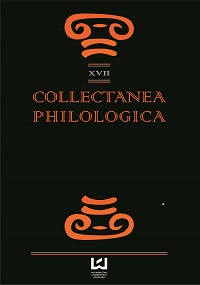Some observations on the etymology and function of two umbrian the onyms
DOI:
https://doi.org/10.18778/1733-0319.17.06Keywords:
Umbrian language, etymology, historical linguisticsAbstract
The article deals with the names of two Umbrian deities written in the Iguvine Tablets, PUEMUNE (dat. sg. m.) and VESUNE (dat. sg. f.). The author relates the Umbrian forms to the Indo-European roots *pō(i)- and *ṷes-, both of them meaning ‘to pasture’, which produce respectively: Lith. piemÂnÅ (f.) ‘shepherdess’, piemẽo (m.) ‘shepherd’, Gk. poim»n (m.) ‘id.’ and Hitt. ṷēštara- (c.) ‘shepherd’, Av. vāstar- (m.) ‘id.’. The Umbrian theonym PUEMUN- can be connected with the Lusitanian name of the pastoral goddess Poemanae (dat. sg. f.). The root ves- of the other Umbrian theonym can be compared with the root of the Lusitanian name Vestero (dat. sg. m.) ‘pastoral god’. The Umbrian noun has the suffix IE. *-H noH -, present in the Italic theonyms 1 2 (e.g. Lat. Pōmōna). Pieces of the same sheep were sacrificed to both deities, which additionally proves their pastoral function.
Downloads
Published
How to Cite
Issue
Section
License

This work is licensed under a Creative Commons Attribution-NonCommercial-NoDerivatives 4.0 International License.












